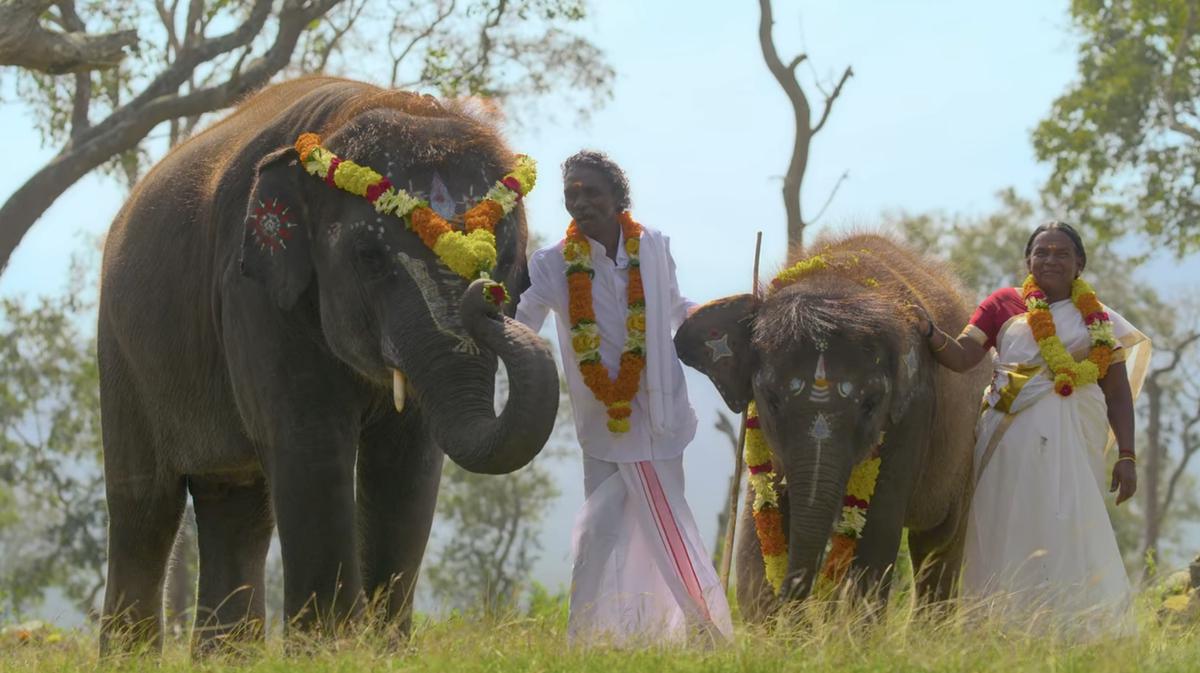[ad_1]
Yulia Navalny, wife of jailed dissident Alexei Navalny, speaks after Navalny was awarded for Best Documentary Feature Film during the Oscars show at the 95th Academy Awards in Hollywood, Los Angeles, California on March 12, 2023
| Photo Credit: Reuters
Being a recognition of effort and validation to the creator aside, awards like the Oscars have an undeniable cultural value that can influence a market like India. This cultural value is bigger than the segmented post-pandemic, post-streaming Indian consumer base. Leave aside the Oscars, we are witnessing live how even some surprises at the box office can spring a trend that adds up to the volatility of this market, such as when a film like KGF: Chapter 2 brings about a handful of projects that try to emulate the same.
The non-fiction scene in India might be far from reaching its full potential in terms of popularity and pop-cultural significance but the overwhelming response to Netflix’s documentary The Elephant Whisperers, both before and after the Oscar win, signify many things. Chiefly, how does the mainstream popularity of non-fiction look in the future? And how significant is the role of streaming platforms in this case?
Role of streaming platforms
Documentaries gained direct access to mainstream consumers when YouTube came into the picture. For fans of non-fiction, earlier there were designated websites or the ever-gracious torrent. So who wouldn’t like it when a reliable business model comes into the mix? There birthed the curve that began with the boom of streaming services like Netflix and Disney+ Hotstar. The list of home-grown documentaries and docu-series that are available to stream were unending. Cut to the present, there is now a notion that streaming platforms might even play a role in the Oscars!

A still from ‘The Elephant Whisperers’
The presence of a nomination on streaming doesn’t decide a win; in fact, the Oscars have the Academy members voting and not the viewers. Yes, The Elephant Whisperers’ presence on Netflix gave it a lot of mileage, and All That Breathes, the Indian nomination that competed in the category of Best Documentary Feature, is yet to find a streaming release in India (it’s out on HBO Max in the U.S.). But ascertaining if the popularity of the title at home, among audiences with the biggest digital presence in the world, played a role in director Kartiki Gonsalves’ win is impossible.
It also might be inaccurate to conclude that the lack of home advantage might be why All That Breathes lost. In the case of the Shaunak Sen directorial and all the other contenders for the Best Documentary Feature, they might just be unlucky: they had to face a goliath in Navalny, the final winner. Navalny, which is streaming on HBO Max, had a lot going for it. The film about the poisoning of Russian opposition leader Alexei Navalny, allegedly by Russian President Vladimir Putin, is coming out at a time when anti-Putin sentiments are on a high, particularly in the U.S. — Oscar’s home and the only country in which HBO Max is available — due to the history between the two and the Russia-Ukraine war.
This might have appealed slightly more to the Academy members than documentaries on a bird-rescuing duo in Delhi ( All That Breathes), the lives of volcanologists ( Fire of Love), and an American war against the opioid epidemic ( All the Beauty and…). A House Made of Splinters, on the orphaned children in eastern Ukraine, is anti-Putin only in spirit. Moreover, Navalny is directly produced by HBO Max, unlike the other nominees. You would expect the streaming giant to go all-out with their campaign.
On the Documentary Short front, The Elephant Whisperers, a documentary not produced by Netflix, bested both The Martha Mitchell Effect and Stranger at the Gate, two films with American political relevance. So, for anything conclusive to be deduced from the Oscar wins, one needs to understand the role the streaming platforms play in campaigning, because, impressing 10,000 academy members takes effort. It might just be the case that it is the subject of the short, the brilliance of Kartiki, and the campaigning prowess of Guneet Monga that got us the win. Our attempts to reach Netflix executives and Kartiki Gonsalves to understand the role Netflix played were unsuccessful. But it is a given that good storytelling always takes more precedence than campaigning.
Importantly, none of these theories stated above takes away the fact that they have all won at the art of docu-filmmaking.
On themes in sub-genres
But one thing’s for sure: at home and away, documentaries have found their home on streaming platforms and there’s no changing that. And Netflix will be taking a closer look at this win.
There’s a high chance that people from the pre-internet era might have a restricted perspective on documentaries, that they are mostly only social commentaries made by the government or NGOs. This tide has changed altogether. If there’s one sub-genre that enjoys the most attention from production houses, streaming platforms, and the audience, it is true-crime. One of the most popular Indian docu titles to come out recently was the 2021 Netflix limited series House of Secrets: The Burari Deaths, which recounted the investigation into the mysterious demise of 11 members of the same family in 2018. Netflix cashed in on this and we got a series of true crime titles, like the Indian Predator series, Crime Stories: India Detectives, and Mumbai Mafia: Police vs Underworld. The sensationalism and shock value of the story will always attract more eyeballs. With true-crime enjoying global success as well, thanks to the likes of the Ted Bundy Tapes, Dahmer – Monster: The Jeffrey Dahmer Story, The Tinder Swindler, Don’t F**k with Cats: Hunting an Internet Killer, and Worst Roommate Ever among others, streamers are just going to keep making more of these.
But subjects that speak of relevant social causes might also see a boost, with a few more factors and clauses of course. Topics like climate change that enjoy relatively more popularity among the audience will take bigger chunks of the cake. Both All That Breathes and The Elephant Whisperers talk about ecological preservation.

A still from ‘All That Breathes’
The favourability and popularity of a theme handled are key. It won’t be far-fetched to assume that, say for instance, a documentary on how climate change affects a species of insects in Coimbatore would get far lesser attention than The Elephant Whisperers — an ant cannot best an elephant here. And the story always takes precedence. Would a documentary about two elephant calves get as much reception as one about how two mahouts raised two orphaned elephant calves with so much love? Biographical documentaries will always have a higher success rate.
Moreover, the socio-political climate of your market is to be taken note of as well. Just months ago, a documentary from BBCcreated chaos in India. And recently, post the Oscar win, many news reports have stated that both Bommie and Bellie, the stars of The Elephant Whisperers, haven’t watched the film yet. While Kartiki herself has replied to these comments stating that she watched the documentary with the two, this has opened the debate about the ethical dilemma that is posed to a creator — whether it is the filmmaker or the subject who deserve the bigger credit and the benefits. Because quite often, documentary filmmakers are criticised to be trespassers who use their subjects for their own artistic satisfaction; a tricky grey area, again.
These are sensitive topics that can once again impact a film’s success, and so in today’s India, risk analysis and management are also key.
The Oscar win for The Elephant Whisperers certainly doesn’t feel like a one-off moment for documentaries, and streaming platforms are here to play a major task, even if they directly or indirectly influence the Oscars or not.
[ad_2]
Source link

